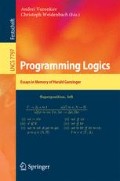Abstract
We present a framework for local interprocedural shape analysis that computes procedure summaries as transformers of procedure-local heaps (the parts of the heap that the procedure may reach). A main challenge in procedure-local shape analysis is the handling of cutpoints, objects that separate the input heap of an invoked procedure from the rest of the heap, which—from the viewpoint of that invocation—is non-accessible and immutable.
In this paper, we limit our attention to effectively cutpoint-free programs—programs in which the only objects that separate the callee’s heap from the rest of the heap, when considering live reference fields, are the ones pointed to by the actual parameters of the invocation. This limitation (and certain variations of it, which we also describe) simplifies the local-reasoning about procedure calls because the analysis needs not track cutpoints. Furthermore, our analysis (conservatively) verifies that a program is effectively cutpoint-free,
Access this chapter
Tax calculation will be finalised at checkout
Purchases are for personal use only
Preview
Unable to display preview. Download preview PDF.
References
Arnold, G., Manevich, R., Sagiv, M., Shaham, R.: Combining Shape Analyses by Intersecting Abstractions. In: Emerson, E.A., Namjoshi, K.S. (eds.) VMCAI 2006. LNCS, vol. 3855, pp. 33–48. Springer, Heidelberg (2006)
Calcagno, C., Distefano, D., O’Hearn, P., Yang, H.: Compositional shape analysis by means of bi-abduction. In: Symp. on Princ. of Prog. Lang. (POPL), pp. 289–300. ACM (2009)
Chase, D.R., Wegman, M., Zadeck, F.: Analysis of pointers and structures. In: Conf. on Prog. Lang. Design and Impl., PLDI (1990)
Chong, S., Rugina, R.: Static analysis of accessed regions in recursive data structures. In: Cousot, R. (ed.) SAS 2003. LNCS, vol. 2694, pp. 463–482. Springer, Heidelberg (2003)
Cousot, P., Cousot, R.: Abstract interpretation: A unified lattice model for static analysis of programs by construction of approximation of fixed points. In: Symp. on Princ. of Prog. Lang. (POPL), pp. 238–252. ACM Press, New York (1977)
Cousot, P., Cousot, R.: Static determination of dynamic properties of recursive procedures. In: Neuhold, E.J. (ed.) Formal Descriptions of Programming Concepts (IFIP WG 2.2, St. Andrews, Canada), pp. 237–277. North-Holland (August 1977)
Deutsch, A.: Interprocedural alias analysis for pointers: Beyond k-limiting. In: Conf. on Prog. Lang. Design and Impl. (PLDI) (1994)
Gotsman, A., Berdine, J., Cook, B.: Interprocedural Shape Analysis with Separated Heap Abstractions. In: Yi, K. (ed.) SAS 2006. LNCS, vol. 4134, pp. 240–260. Springer, Heidelberg (2006)
Hackett, B., Rugina, R.: Region-based shape analysis with tracked locations. In: Symp. on Princ. of Prog. Lang. (POPL) (2005)
Ishtiaq, S.S., O’Hearn, P.W.: BI as an assertion language for mutable data structures. In: Symp. on Princ. of Prog. Lang. (POPL) (2001)
Jeannet, B., Loginov, A., Reps, T., Sagiv, M.: A Relational Approach to Interprocedural Shape Analysis. In: Giacobazzi, R. (ed.) SAS 2004. LNCS, vol. 3148, pp. 246–264. Springer, Heidelberg (2004)
Knoop, J., Steffen, B.: The interprocedural coincidence theorem. In: Int. Conf. on Comp. Construct. (CC) (1992)
Lev-Ami, T., Sagiv, M.: . TVLA: A framework for Kleene based static analysis. In: International Static Analysis Symposium (SAS) (2000), http://www.math.tau.ac.il/~tvla
Marron, M., Hermenegildo, M., Kapur, D., Stefanovic, D.: Efficient context-sensitive shape analysis with graph based heap models. In: Int. Conf. on Comp. Construct. (CC), pp. 245–259 (2008)
Noble, J., Biddle, R., Tempero, E., Potanin, A., Clarke, D.: Towards a model of encapsulation. In: The First International Workshop on Aliasing, Confinement and Ownership in Object-Oriented Programming (IWACO) (2003)
Plotkin, G.D.: A Structural Approach to Operational Semantics. Technical Report DAIMI FN-19, University of Aarhus (1981)
Reps, T., Horwitz, S., Sagiv, M.: Precise interprocedural dataflow analysis via graph reachability. In: Symp. on Princ. of Prog. Lang. (POPL) (1995)
Reynolds, J.: Separation logic: a logic for shared mutable data structures. In: Symp. on Logic in Computer Science (LICS) (2002)
Rinetzky, N.: Interprocedural and Modular Local Heap Shape Analysis. PhD thesis, Tel Aviv University (June 2008)
Rinetzky, N., Bauer, J., Reps, T., Sagiv, M., Wilhelm, R.: A semantics for procedure local heaps and its abstractions. In: Symp. on Princ. of Prog. Lang. (POPL) (2005)
Rinetzky, N., Poetzsch-Heffter, A., Ramalingam, G., Sagiv, M., Yahav, E.: Modular Shape Analysis for Dynamically Encapsulated Programs. In: De Nicola, R. (ed.) ESOP 2007. LNCS, vol. 4421, pp. 220–236. Springer, Heidelberg (2007)
Rinetzky, N., Sagiv, M.: Interprocedural shape analysis for recursive programs. In: Int. Conf. on Comp. Construct. (CC) (2001)
Rinetzky, N., Sagiv, M., Yahav, E.: Interprocedural Shape Analysis for Cutpoint-Free Programs. In: Hankin, C., Siveroni, I. (eds.) SAS 2005. LNCS, vol. 3672, pp. 284–302. Springer, Heidelberg (2005)
Rubinstein, S.: On the utility of cutpoints for monitoring program execution. Master’s thesis, Tel Aviv University, Tel Aviv, Israel (2006)
Sagiv, M., Reps, T., Wilhelm, R.: Parametric shape analysis via 3-valued logic. Trans. on Prog. Lang. and Syst. (TOPLAS) 24(3), 217–298 (2002)
Shaham, R., Yahav, E., Kolodner, E.K., Sagiv, M.: Establishing Local Temporal Heap Safety Properties with Applications to Compile-time Memory Management. In: Cousot, R. (ed.) SAS 2003. LNCS, vol. 2694, pp. 483–503. Springer, Heidelberg (2003)
Sharir, M., Pnueli, A.: Two approaches to interprocedural data flow analysis. In: Muchnick, S.S., Jones, N.D. (eds.) Program Flow Analysis: Theory and Applications, ch.7, pp. 189–234. Prentice-Hall, Englewood Cliffs, NJ (1981)
Yang, H., Lee, O., Berdine, J., Calcagno, C., Cook, B., Distefano, D., O’Hearn, P.W.: Scalable Shape Analysis for Systems Code. In: Gupta, A., Malik, S. (eds.) CAV 2008. LNCS, vol. 5123, pp. 385–398. Springer, Heidelberg (2008)
Author information
Authors and Affiliations
Editor information
Editors and Affiliations
Rights and permissions
Copyright information
© 2013 Springer-Verlag Berlin Heidelberg
About this chapter
Cite this chapter
Kreiker, J., Reps, T., Rinetzky, N., Sagiv, M., Wilhelm, R., Yahav, E. (2013). Interprocedural Shape Analysis for Effectively Cutpoint-Free Programs. In: Voronkov, A., Weidenbach, C. (eds) Programming Logics. Lecture Notes in Computer Science, vol 7797. Springer, Berlin, Heidelberg. https://doi.org/10.1007/978-3-642-37651-1_17
Download citation
DOI: https://doi.org/10.1007/978-3-642-37651-1_17
Publisher Name: Springer, Berlin, Heidelberg
Print ISBN: 978-3-642-37650-4
Online ISBN: 978-3-642-37651-1
eBook Packages: Computer ScienceComputer Science (R0)

